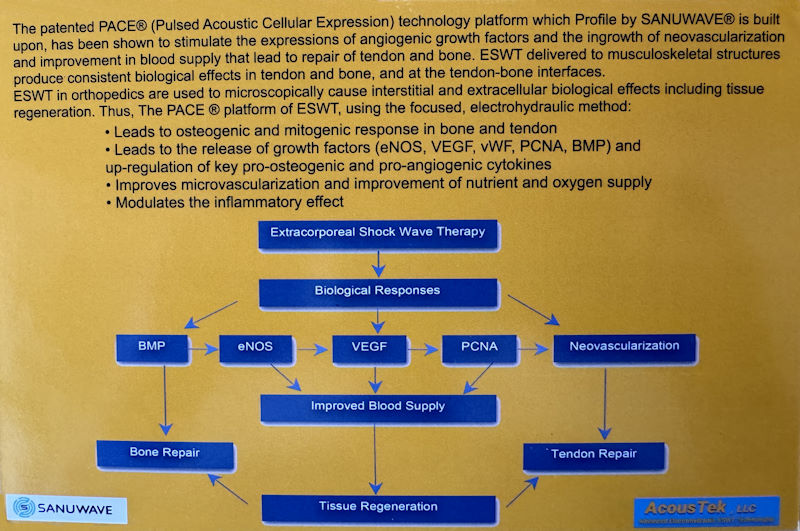Life Without Chronic Pain!
Common Examples of Chronic Pain Syndromes that Respond Poorly to Current Treatment Options:
- Low Back Pain
- Shoulder Pain (Frozen Shoulder)
- Hip Pain
- Neck Pain
- Elbow Pain
- Wrist Pain/Carpal Tunnel
- Knee Pain
- Foot/Ankle Pain
- Plantar Fasciitis
- Bursitis
- Arthritis
- BONUS DISCUSSION: Neuropathy
What is Inflammation Really?
 Definition of Inflammation: Inflammation is a natural and necessary biological response of the body to injury, infection, or irritation. It is a complex process involving various
immune cells, signaling molecules, and tissues working together to protect the body and promote healing. The primary purpose of inflammation is to remove harmful stimuli, such as pathogens or damaged cells, and initiate the repair of damaged tissues.
Definition of Inflammation: Inflammation is a natural and necessary biological response of the body to injury, infection, or irritation. It is a complex process involving various
immune cells, signaling molecules, and tissues working together to protect the body and promote healing. The primary purpose of inflammation is to remove harmful stimuli, such as pathogens or damaged cells, and initiate the repair of damaged tissues.
This protective response is crucial for the body’s defense against infections and injuries. However, if inflammation is excessive or prolonged, it can contribute to tissue damage and the development of chronic diseases, such as arthritis, asthma, cardiovascular disease, and inflammatory bowel disease.
Pros and Cons of the Most Common Treatment for Chronic Inflammation and Pain
Nonsteroidal Anti-Inflammatory Drugs (NSAIDs): NSAIDs, such as ibuprofen (Advil, Motrin) and naproxen (Aleve), are widely used to relieve pain and inflammation. They work by inhibiting the production of prostaglandins, which are chemical messengers involved in the inflammatory process. NSAIDs are commonly used to manage conditions like arthritis, tendonitis, and menstrual cramps.
- Easy to get for the most part
- Relatively fast-acting
- Cheap
- Temporary Relief
- Stomach Pain
- Blocks Anti inflammatory Cytokines?
- Increased risk of heart disease, heart attacks, and strokes, particularly when used in high doses or for prolonged periods.
- Never actually fixes the problem and becomes a lifelong treatment
What About Steroids?
 Corticosteroids: Corticosteroids, such as prednisone and dexamethasone, are potent
anti-inflammatory medications that mimic the action of cortisol, a hormone naturally produced
by the body. Corticosteroids suppress the immune response and reduce inflammation by
inhibiting the production of inflammatory cytokines and immune cells. They are used to
manage a wide range of inflammatory conditions, including autoimmune disorders, asthma,
and inflammatory bowel disease.
Corticosteroids: Corticosteroids, such as prednisone and dexamethasone, are potent
anti-inflammatory medications that mimic the action of cortisol, a hormone naturally produced
by the body. Corticosteroids suppress the immune response and reduce inflammation by
inhibiting the production of inflammatory cytokines and immune cells. They are used to
manage a wide range of inflammatory conditions, including autoimmune disorders, asthma,
and inflammatory bowel disease.
Corticosteroids work by suppressing the immune response and inhibiting the production of inflammatory cytokines, which helps reduce inflammation and pain. However, they can also impair the normal healing response by:
- Inhibiting Fibroblast Activity: Fibroblasts are cells involved in the synthesis of collagen, the primary structural protein in connective tissues. Corticosteroids can inhibit fibroblast activity, leading to decreased collagen production and impaired tissue repair.
- Decreasing Angiogenesis: Angiogenesis is the process of forming new blood vessels, which is essential for delivering oxygen and nutrients to healing tissues. Corticosteroids can suppress angiogenesis, leading to poor blood supply to the injured area and delayed healing.
- Suppressing Inflammatory Cells: While corticosteroids reduce inflammation, they can also suppress the activity of inflammatory cells involved in the early stages of the healing process. This can disrupt the normal sequence of events in tissue repair and delay healing.
- Weakening Tendons: Prolonged or repeated use of corticosteroid injections in or around tendons has been associated with tendon weakening, degeneration, and an increased risk of tendon rupture. This is thought to be due to the inhibition of collagen synthesis and the disruption of the normal balance between collagen production and breakdown.
Topical Treatments: Topical medications, such as corticosteroid creams, ointments, and gels, are used to treat localized inflammation in conditions like eczema, psoriasis, and dermatitis.
Common Causes of Chronic Inflammation
 Autoimmune Disorders: Conditions such as rheumatoid arthritis, lupus, psoriasis, and inflammatory bowel disease result from the immune system mistakenly attacking healthy tissues, leading to chronic inflammation.
Autoimmune Disorders: Conditions such as rheumatoid arthritis, lupus, psoriasis, and inflammatory bowel disease result from the immune system mistakenly attacking healthy tissues, leading to chronic inflammation.
Obesity:Adipose tissue (fat) produces inflammatory cytokines, and excess fat, especially around the abdomen, can lead to chronic low-grade inflammation, contributing to obesity-related complications like type 2 diabetes and cardiovascular disease.
Chronic Infections: Persistent infections by bacteria, viruses, or other pathogens, such as tuberculosis, hepatitis C, or HIV, can lead to chronic inflammation if the immune system is unable to completely clear the infection.
Environmental Factors: Exposure to environmental pollutants, toxins, allergens, and irritants can trigger chronic inflammation. This includes pollutants in the air, water, and food, as well as chemicals found in household products and pesticides.
 Poor Diet: A diet high in processed foods, refined carbohydrates, sugars, trans fats, and saturated fats can promote inflammation. Conversely, a diet rich in fruits, vegetables, whole grains, and healthy fats has anti-inflammatory effects.
Poor Diet: A diet high in processed foods, refined carbohydrates, sugars, trans fats, and saturated fats can promote inflammation. Conversely, a diet rich in fruits, vegetables, whole grains, and healthy fats has anti-inflammatory effects.
Chronic Stress: Prolonged stress can dysregulate the immune system and promote inflammation through the release of stress hormones like cortisol and inflammatory cytokines.
Sedentary Lifestyle: Lack of physical activity is associated with chronic inflammation and an increased risk of chronic diseases. Regular exercise has anti-inflammatory effects and helps regulate immune function.
Smoking: Cigarette smoke contains numerous harmful chemicals that can trigger inflammation in the lungs and throughout the body, contributing to conditions like chronic obstructive pulmonary disease (COPD) and cardiovascular disease.
Alcohol Consumption: Excessive alcohol intake can lead to inflammation in the liver (alcoholic hepatitis), pancreas (pancreatitis), and other organs, increasing the risk of liver disease, gastrointestinal issues, and other complications.
Aging: Aging is associated with increased levels of inflammation in the body, a phenomenon known as inflammaging. As people age, there is a gradual decline in immune function and increased production of pro-inflammatory cytokines.
Would You Like to Learn About a New, and Proven Treatment We Now Offer to Rapidly Decrease Pain and Inflammation?









